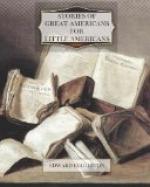Mr. Bliss had ex-am-ined a great many schoolteachers. He liked to puzzle teachers with hard questions. He thought he would try Horace with these. But the gawky boy answered them all. This tow-headed boy seemed to know everything.
Mr. Bliss took a piece of paper from his pocket. He wrote on it, “Guess we’d better try him.”
He gave this paper to Horace, and told him to take it to the printing office. Horace, with his little white hat and strange ways, went into the printing office. The boys in the office laughed at him. But the foreman said he would try him.
That night the boys in the office said to Mr. Bliss, “You are not going to take that tow head, are you?”
Mr. Bliss said, “There is something in that tow-head. You boys will find it out soon.”
[Illustration: Greeley setting Type]
A few days after this, Horace came to East Poult-ney to begin his work. He carried a little bundle of clothes tied up in a hand-ker-chief.
The fore-man showed him how to begin. From that time he did not once look around. All day he worked at his type. He learned more in a day than some boys do in a month.
Day after day he worked, and said nothing. The other boys joked him. But he did not seem to hear them. He only kept on at his work. They threw type at him. But he did not look up.
The largest boy in the office thought he could find a way to tease him. One day he said that Horace’s hair was too white. He went and got the ink ball. He stained Horace’s hair black in four places. This ink stain would not wash out. But Horace did not once look up.
After that, the boys did not try to tease him any more. They all liked the good-hearted Horace. And everybody in the town wondered that the boy knew so much.
Horace’s father had moved away to Penn-syl-va-ni-a. Horace sent him all the money he could spare. He soon became a good printer. He started a paper of his own. He became a famous news-paper man.
A WONDERFUL WOMAN.
Little Dor-o-thy Dix was poor. Her father did not know how to make a living. Her mother did not know how to bring up her children.
The father moved from place to place. Sometimes he printed little tracts to do good. But he let his own children grow up poor and wretched.
Dor-o-thy wanted to learn. She wanted to become a teacher. She wanted to get money to send her little brothers to school.
Dor-o-thy was a girl of strong will and temper. When she was twelve years old, she left her wretched home. She went to her grand-mother. Her grand-mother Dix lived in a large house in Boston. She sent Dorothy to school.
Dorothy learned fast. But she wanted to make money. She wanted to help her brothers. When she was fourteen, she taught a school. She tried to make herself look like a woman. She made her dresses longer.




